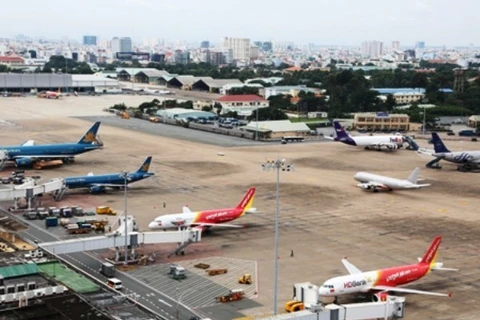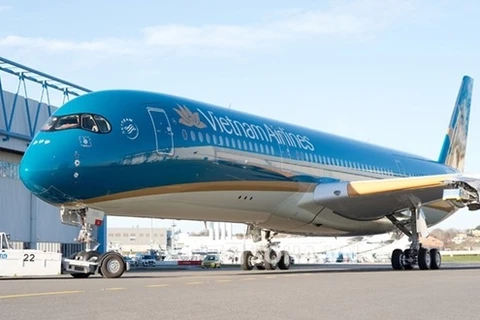 VASCO has been turned into a low-cost airline by its parent, Vietnam Airlines, which retains the remaining the 51 percent share. (Photo: airline.ee)
VASCO has been turned into a low-cost airline by its parent, Vietnam Airlines, which retains the remaining the 51 percent share. (Photo: airline.ee) HCM City (VNA) – The Vietnam Technological and Commercial Joint Stock Bank (Techcombank) will pick up a 49 percent stake in VASCO after committing to inject 147 billion VND into the restructured carrier.
VASCO has been turned into a low-cost airline by its parent, Vietnam Airlines, which retains the remaining the 51 percent share.
The airline has a charter capital of 300 billion VND (13.43 million USD) and around 10 aircraft.
This is not Techcombank’s first foray into the aviation sector. It became a shareholder in Vietnam Airlines when it picked up 25.76 million shares (1.82 percent) in the carrier’s initial public offering in November 2014. State-owned Vietcombank bought a 1.6 percent stake.
HDBank holds a 10 percent stake in no-frills carrier Vietjet Air.
Global winds blowing into the Vietnamese aviation sector as a result of the country’s deeper integration has forced it to open up, and carriers have had to improve quickly and in all areas to survive. They have had to expand their fleets and diversify their services for which they needed large sums of money. This was where banks entered, sensing a tremendous opportunity to not only earn profits but also expand market share and promote their brands.
The cooperation has been in various forms like providing credit and financial services, payment guarantees, and co-branded credit and debit cards.
Techcombank and Vietcombank had even more reason to invest in Vietnam Airlines: Both have been providing banking services to the carrier for years and have enjoyed a long relationship with it.
Techcombank has been part of many consortia that provided syndicated loans to Vietnam Airlines to buy aircraft. In return, the bank offers the carrier and its passengers various services.
Vietcombank has also been lending to Vietnam Airlines besides providing capital management and domestic and overseas payment services and tying up for co-branded credit cards.
Since last April Vietcombank has also begun to provide this service to Vietjet Air.
PVcombank is another lender to offer air ticket payment services after tying up with Vietnam Airlines and Vietjet Air. The bank’s logo has appeared on Vietnam Airlines boarding passes since last month.
Explaining the attraction airlines have for them, the banks said they do not pick up the stakes just to make profits, but because of other long-term benefits.
In fact, airlines’margins are low, but the banks also earn incomes through services it provides the airlines and their customers and tie-ups under which the carriers’ employees’ salaries are paid through them.
Analysts said the aviation sector is attractive for investors, but in the past banks and other investors could not get a share of this pie since it used to be the monopoly of State-owned firms.
In recent years the aviation sector has also moved towards equitisation like most others, making the playing field a bit more level for investors.
The strong growth in aviation in recent years - turnover rose by 129 percent last year – is the icing on the cake for the banks and other investors.
But some point out that, the huge potential notwithstanding, the investments are not without their risks, citing the example of now defunct carriers like Air Mekong and Indochina Air.-VNA






















